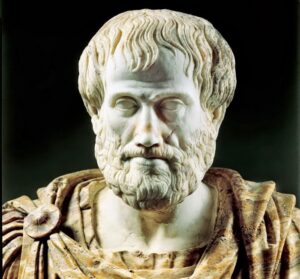 Aristotle was an ancient and worthy sage. He produced our modern definition of story, “A whole [story] is what has a beginning and middle and end.”
Aristotle was an ancient and worthy sage. He produced our modern definition of story, “A whole [story] is what has a beginning and middle and end.”
Around 335 B.C. he closeted himself with several armloads of theater scripts and produced an analysis of why/how plays, the entertainment form of the day, made and kept the plebians happy.
This treatise, entitled Poetics, provided a rubric of story constructs for classifying all plays/stories that are still used today. Academia has validated his approach repeatedly. Ivory Tower professors avoiding the research = smart people because the work was already done.
Those story elements, Aristotle hypothesized, could plug into our imagination, our emotions, and other parts of our psyche, troubleshooting and even improving our mental function.
Aristotle was an obvious brainiac and I’d love to have met him.
The story constructs he devined were/are as follows. I’ll provide examples and definitions to ease your understanding. (I loved this research):
- plot twist – this ploy needs no introduction in present times.
- the hurt delay… if only this occurred in daily life, deferring hurt until the afterlife (wink-wink)
- a tale told from the future, as cautionary and/or informative tale. Today this is the foundation of the modern thriller, a high-selling genre of books.
- the secret discloser… could this be a gossip? Psst…
- the serenity elevator, intended to invoke tranquility within.
- the empathy generator, in which we are able to observe the private lives of characters such as in the books Little Women and Job.
- the almighty heart in which an omniscient narrator shares wisdom for all, such as in The Iliad and the GOD of the Bible.
- the anarchy rhymer.
That’s me, who imagines herself as a brainiac and is a bit lawless about the rules of literary genre and such.
Here’s my favorite nonsensical nursery rhyme, written by our Mother Goose, to illustrate my preference:

https://www.insecurewriterssupportgroup.com/p/iwsg-sign-up.html


Recent Comments